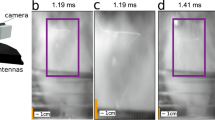Abstract
A NEW technique has been developed for the recording of the progress of a shock wave through a transparent material. The present communication gives a brief account of the technique and its application to the study of shock initiation of detonation in a solid explosive.
This is a preview of subscription content, access via your institution
Access options
Subscribe to this journal
Receive 51 print issues and online access
$199.00 per year
only $3.90 per issue
Buy this article
- Purchase on Springer Link
- Instant access to full article PDF
Prices may be subject to local taxes which are calculated during checkout
Similar content being viewed by others
References
Walsh, J. M., and Rice, M. H., J. Chem. Phys., 26, 815 (1957).
Buchanan, J. S., James, H. J., and Teague, G. W., Phil. Mag., 3, 1432 (1958).
Paterson, S., and Lamb, P., J. Phot. Sci., 9, 363 (1961).
Deal, W. E., Phys. Fluids, 1, 523 (1958).
Author information
Authors and Affiliations
Rights and permissions
About this article
Cite this article
BERG, U., PERSSON, P. Multiple Flash-Gap Technique for Measuring Shock Wave Velocities. Nature 197, 65–66 (1963). https://doi.org/10.1038/197065a0
Issue Date:
DOI: https://doi.org/10.1038/197065a0
Comments
By submitting a comment you agree to abide by our Terms and Community Guidelines. If you find something abusive or that does not comply with our terms or guidelines please flag it as inappropriate.



